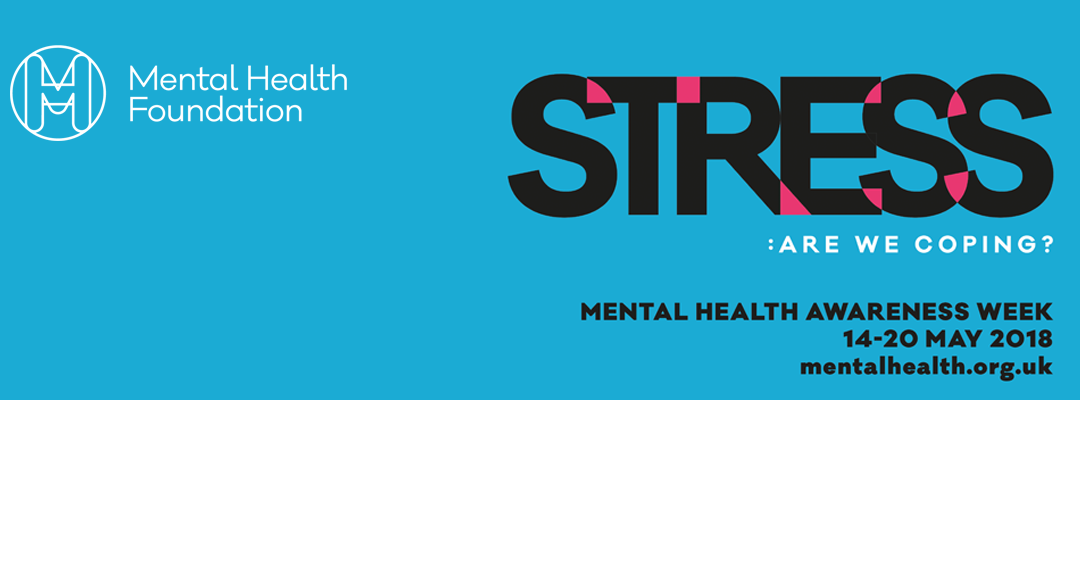Hosted by the Mental Health Foundation the theme for Mental Health Awareness Week 2018 is: ‘Stress: are we coping?‘
There is some really interesting and useful information on the Mental Health Foundation website, here is just a taste…..
What is stress?
Stress is a feeling of being under abnormal pressure. This pressure can come from different aspects of your day to day life, such as an increased workload, a transitional period, an argument you have with your family or financial worries. You may find that it has a cumulative effect, with each stressor building on top of one another.
During these situations you may feel threatened or upset and your body might create a stress response. This can cause a variety of physical symptoms, change the way you behave and lead you to experience more intense emotions.
Stress affects us in a number of ways, both physically and emotionally and in varying intensities.
Identifying the signs of stress
Everyone experiences stress. However, when it is affecting your life, health and wellbeing, it is important to tackle it as soon as possible. While stress affects everyone differently, there are common signs and symptoms you can look out for:
- Feelings of constant worry or anxiety
- Feelings of being overwhelmed
- Difficulty concentrating
- Mood swings or changes in mood
- Irritability or having a short temper
- Difficulty relaxing
- Depression
- Low self-esteem
- Eating more or less than usual
- Changes in sleeping habits
- Using alcohol, tobacco or illegal drugs to relax
- Aches and pains, particularly muscle tension
- Diarrhoea and constipation
- Feelings of nausea or dizziness
If you experience these symptoms for a prolonged period of time and feel they are affecting your everyday life or making you feel unwell, you should speak to your GP.
You can also help protect yourself from stress in a number of ways:
- Eat a nutritious diet, keep hydrated and cut out or down on toxins such as caffeine, alcohol and smoking.
- Be active – even a small amount of physical exercise, particularly out in the fresh air will help.
- Take time out to relax and do something that you enjoy.
- Use mindfulness meditation – research has suggested that it can, for some people, reduce the effects of stress, anxiety and other related problems such as insomnia, poor concentration and low moods.
- Get some restful sleep – sometimes easier said than done!
- Don’t be too hard on yourself – try to keep things in perspective. After all, we all have bad days.
How can Massage Help?
The Mental Health Foundation has published a list of 101 tips on how to manage stress and “book a massage or spend time in a spa with a friend” is number 18 on that list.
That’s where the Garden Room can help; we offer a welcoming and calming space. Many of my clients comment on how quickly they feel relaxed when they visit.
Massage in itself is relaxing……you get to lie down for an hour!! Seriously though, it eases tense muscles, promotes deeper breathing, improves circulation and brings about a wonderful feeling of wellbeing. Many people relax sufficiently to fall asleep during treatments and often report improved sleep following a massage.
Pre-blended aromatherapy massages offer the additional benefits of oils that relax, soothe and ease aches and pains, with lovely ingredients including, lavender, chamomile, juniper, rosemary, sandalwood and ylang ylang.
Based on client feedback, the most relaxing treatments provided are full body pre-blended aromatherapy, Indian head and scalp and face massages.
So, if you’re feeling frazzled, rather than ignoring it and hoping it will go away or hitting the wine bottle, why not try a massage treatment?
The Garden Room may not be a spa but you are more than welcome to come along with a friend, we have a comfy conservatory where one can wait, whist the other has their treatment. We often find the one waiting snoozing in the relaxer chair!
I’ve been really heartened by a few of my clients lately, who have recognised that they need to look after themselves better, both physically and mentally, and are booking regular treatments as part of their routine. And especially by a handful of people who have booked and paid for a friend or partner to have a treatment because they are having a particularly difficult time……..now that’s what you call friendship!!
If you have reservations about massage, we also offer Reiki treatments. Reiki is a hands on (or off, if preferred) healing treatment during which you remain clothed. It is extremely relaxing and promotes a wonderful feeling of wellbeing.
For more information about stress and mental health go to:
To discover the fabulous stress relieving benefits of massage and Reiki and to book, please go to: www.stroudmassagetherapy.co.uk

